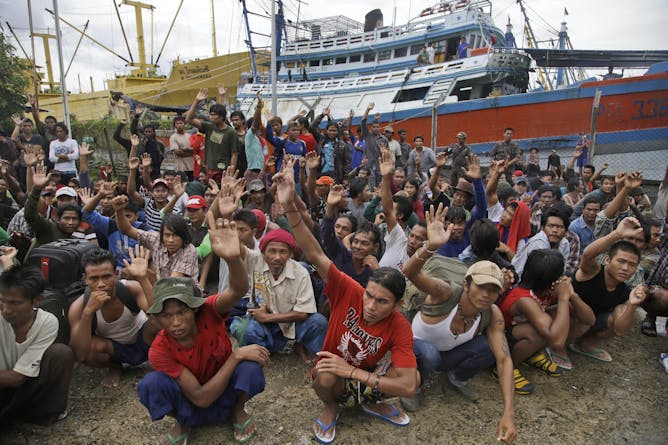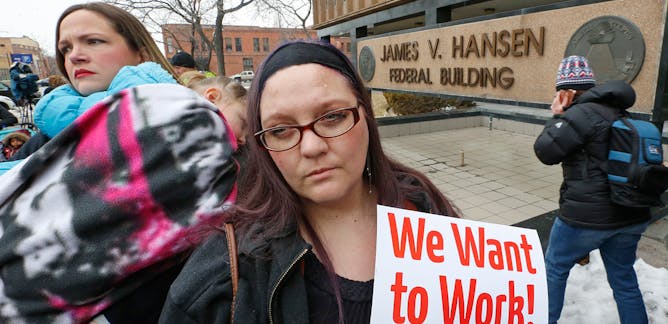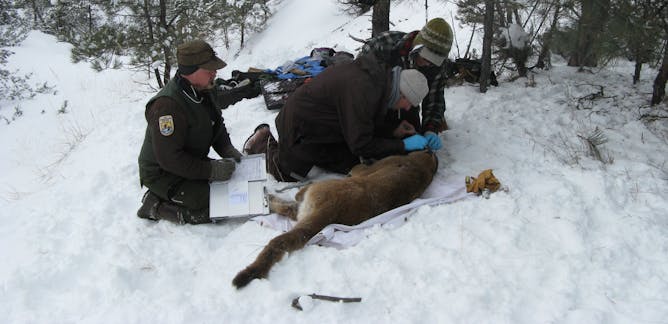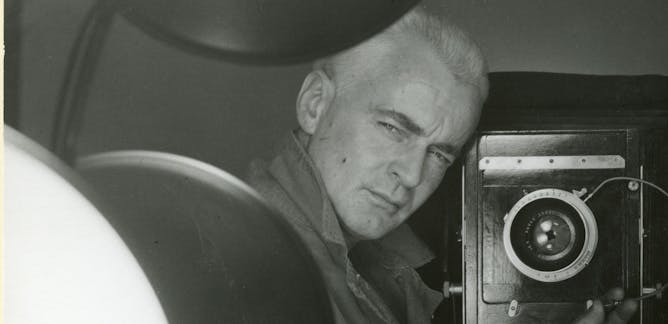|
|
|
Editor's note
|
|
Americans are beginning to accept that Russian disinformation campaigns are actively seeking to disrupt our society, including social media, news organizations and businesses. Other countries have been fighting similar battles for decades. Security scholar Terry Thompson at the University of Maryland, Baltimore County, explains what the U.S. might learn from the experience of Estonia, Latvia and Lithuania.
January is Human Trafficking Awareness Month – but how many people are actually enslaved worldwide? Estimates of modern slavery vary widely, whether they try to capture trafficking in the U.S., across the globe or just in certain industries. The University of Richmond’s Monti Datta tries to pin down the right number.
And, when it comes to selecting which students to admit, elite universities have an overabundance of qualified applicants from which to choose. But do they choose in a fair manner? History shows they heavily favor students who are well off. College admissions scholar Natasha Warikoo suggests a more equitable way would be to take humans out of the equation and admit students by drawing their names out of an “electronic hat.”
|
Jeff Inglis
Science + Technology Editor
|

|
|
Top stories
|

Look out for Russian influence.
M-SUR/Shutterstock.com
Terry Thompson, University of Maryland, Baltimore County
European countries, especially the Baltic states of Estonia, Latvia and Lithuania, have confronted Russian disinformation campaigns for decades. The US can learn from their experience.
|

Burmese fishermen raise their hands as they are asked who among them wants to go home. Human trafficking sometimes occurs in the seafood industry.
AP Photo/Dita Alangkara
Monti Datta, University of Richmond
Estimates of modern slavery vary widely, whether they try to pin down numbers in the U.S., across the globe or just in certain industries.
|

Could a random admissions process help spare universities from legal trouble and save time and money?
Adam Alagna/www.shutterstock.com
Natasha Warikoo, Harvard University
Colleges and universities are often criticized for how they admit students from diverse groups. A college admissions scholar suggests an admissions lottery could help make the process more fair.
|
Economy + Business
|

Parker Ellen, Northeastern University
Trump, Schumer and Pelosi have fallen into a classic negotiation trap that often prevents deals from getting made, which has led to the shutdown stalemate.
| |

Jay L. Zagorsky, Boston University
Because many Americans live paycheck to paycheck, the loss of even one can be a big financial blow for a family.
|
|
|
Politics + Society
|

David Smilde, Tulane University
Maduro, who was sworn in for his second term on Jan. 10, has rigged elections, jailed rivals and plunged Venezuela into crisis. But Trump's proposed 'military option' to remove him remains unpopular.
| |

Paul J. Fleming, University of Michigan; William D. Lopez, University of Michigan
Interviews with immigrants health service providers in metro Detroit reveal a climate of fear that may affect the health of families.
|
|
|
|
Health + Medicine
|

Camilla Nonterah, University of Richmond
Behavior change is very hard. Try as we might to keep those New Year's resolutions, many have given up by this time. Here are some ways to keep going and stay on track, from a counseling psychologist.
| |

Heidi Silver, Vanderbilt University
When did eating become so confusing? In the 1960s, studies began to show a link between heart disease and dietary fat, and fat was demonized. As it turns out, fat is nuanced and may not be so bad.
|
|
|
Science + Technology
|

Angela K. Wilson, Michigan State University
Setting aside personal hardships for workers who don't see a paycheck during the shutdown, the research enterprise itself loses out, too. And unlike back pay, this lost time can never be made up.
| |

Scott Shackelford, Indiana University
In the space beyond Earth's atmosphere, countries are focusing on nationalist pursuits and ignoring the consequences for the rest of humanity. How can we keep the peace and build a sustainable future?
|
|
|
|
|
Ethics + Religion
|

A. Trevor Sutton, Concordia Seminary
Don't swear off social media. Use it to your advantage.
| |

Catherine O'Donnell, Arizona State University
Elizabeth Seton was canonized in 1975 as a saint. Charities founded by her continue her work with poor immigrants.
|
|
|
Arts + Culture
|

Rebecca Fasman, Indiana University
Lynes was a highly sought-after commercial and fashion photographer in the 1930s and 1940s. But he had to keep his most important body of work hidden away.
| |

Mark Canada, Indiana University; Christina Downey, Indiana University
Edgar Allen Poe, Sigmund Freud and cognitive scientists have all wrestled with the human tendency to behave in ways that are irrational and self-defeating.
|
|
|
Environment + Energy
|

Robert Twilley, Louisiana State University ; Andre Rovai, Louisiana State University
Mangrove forests along the world's tropical and subtropical coasts store enormous quantities of 'blue' carbon – especially in river delta zones, where soil builds up quickly.
| |

Gilbert E. Metcalf, Tufts University
There are ways to reduce the risk of protests like France's yellow vests movement.
|
|
|
| |
|
|
|
|
|
|
|